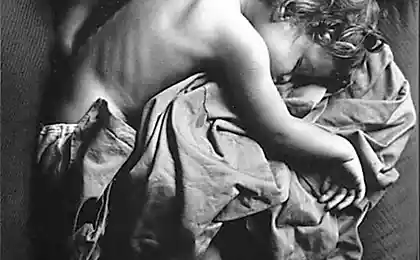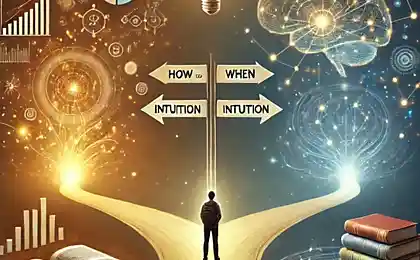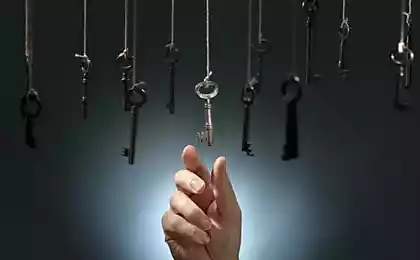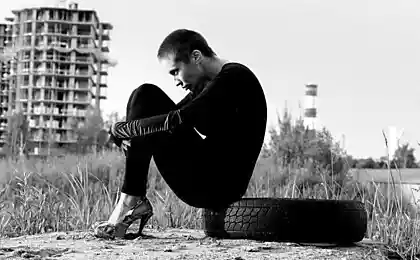409
Whether to trust intuition: a simple technique for checking

Think about how often you have made a decision based on
Not in a cold calculation, but in a certain inner voice: "Something tells me,
that it would be better to do so.” We call this quiet and seemingly irrational advice intuition.
Some consider it a mystical phenomenon, others - the result of a lot of knowledge and experience accumulated in the subconscious.
No matter how we try to define it, the fact remains that intuition often helps to avoid mistakes or vice versa.
It guides us on the right path. But the question is, is it really worth relying on?
We offer to understand and test a simple technique that allows you to test the power of your own intuition.

What is intuition and why we trust it
Intuition usually means sudden insights that appear out of nowhere.
There's no visible logical chain. It is based on the hypothesis that our subconscious analyzes
A huge amount of data, snatching out factors that are deliberately eluding us.
Therefore, the “feeling” of the right decision may appear before we realize it rationally.
There is an opinion that intuition is more developed in people with rich life experience in a certain field.
For example, an experienced doctor can make a diagnosis at the sixth sense level.
Because I've had similar symptoms many times before. But intuition can also work.
In our personal lives, we often feel “warmth” or “tension” when dealing with certain people.
And that becomes the criterion of our choice of friends or partners.

When your intuition can fail
Although intuition sometimes seems almost magical,
It can lead us to a dead end if:
- We are in a stressful situation.
Strong emotions and anxiety drown out the sober voice of our subconscious.
Making hasty decisions. - We're full of prejudice.
Negative experiences from the past or stereotypes instilled by society
They can give false signals that seem intuitive. - We're too eager for confirmation.
In an effort to justify our desire, we sometimes attribute to it the status of “intuitive premonition”.
It may be self-deception.
Therefore, there is no single correct advice to “always rely on intuition” or “ignore it.”
Every situation requires a certain balance. The main thing is to learn to listen to the inner voice.
But also to understand when our "recognition system" may fail.
A Simple Technique to Test Your Intuition
To understand how strong your intuition is and when to trust it,
Try using the following little experiment.
- Identify the problem or question.
Let it be a real life situation: a job choice, a financial decision.
holiday planning, etc. - Formulate two or three options.
For example, “Remain in your current job,” “Change your company,” or “Start your own business.” - Write down the first associations.
Literally, take a pen and paper. Think of each scenario and note,
What feelings and sensations arise in the body. Do not look for logic, just fix: anxiety,
inner comfort, excitement, fear, curiosity. - Give yourself time to sleep with the decision.
For a day or even a few days postpone the choice. Do the usual things.
without going through the situation in my head. Let the subconscious mind work without your active intervention. - Compare the feeling with the actual result.
After this period, make a choice according to logical and pragmatic criteria.
But notice how intuition responds. Later, after a while,
Do you think your subconscious feeling is closer to reality or not?

What do we do with the results?
If you notice that your intuition often coincides with reality,
So you really need to let this "silent adviser" sound louder.
But that doesn't absolve you of the need to collect facts and analyze them.
Rather, an intuitive impulse can become a “bell” to test a hypothesis in more detail.
And if your “premonitions” are false,
Maybe it's emotions, old traumas, or some kind of bias against the situation.
Then we need to focus on facts and objective information.
A intuition to take the role of the "second violin".
In any case, it is worth remembering that intuition is not some kind of system error.
It's one of the tools we can use to make decisions.
The main thing is to learn how to treat it correctly and evaluate its signals correctly.
Balancing Intuition and Mind is the Key to Success
Intuition defies simple scientific explanation.
Yet countless examples from life, art and science show that
It can lead us in the right direction, or at least give us ideas.
which our minds have not seen. However, relying only on her.
It means risking falling into the trap of illusions and delusions.
This is why there is a reasonable compromise between logical analysis and subtle inner sensations.
It is the best strategy for most difficult situations.
Whether or not to trust your intuition is not an easy question.
But if you learn to listen to your inner voice and test its hypotheses in practice,
This will give you the indispensable skill to react quickly in moments of uncertainty.
After all, sometimes it is the “unexplained premonition” that saves us from danger or helps to “catch” a happy chance.
Well, maybe it's time to stop thinking of intuition as superstition and learn to take advantage of it.
Not to mention critical thinking and analytics.























